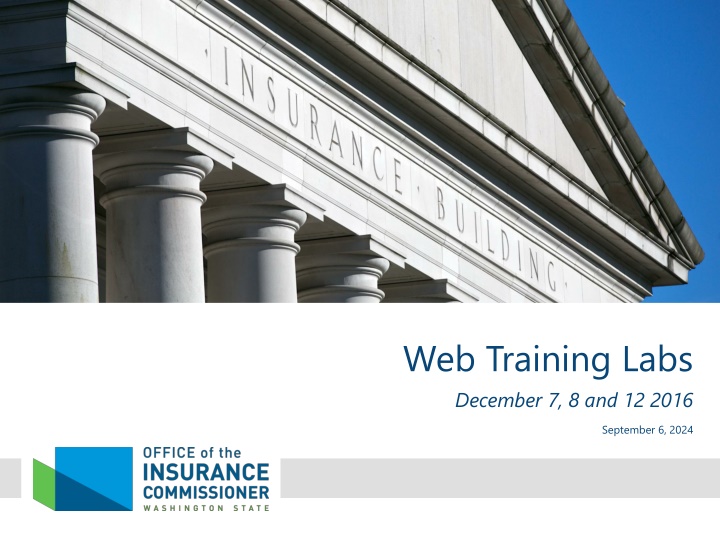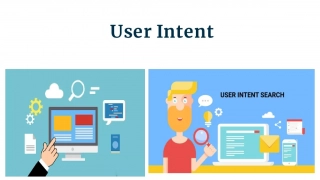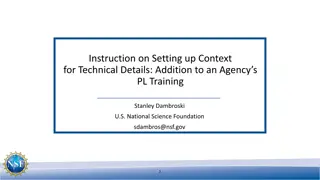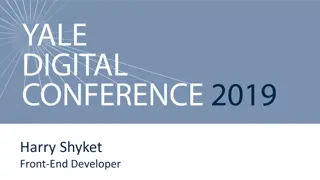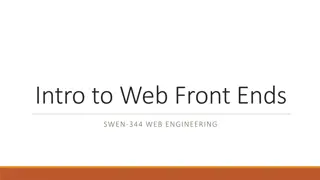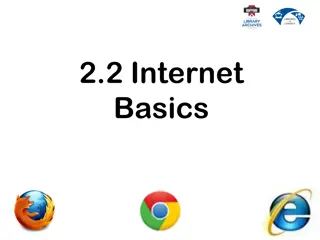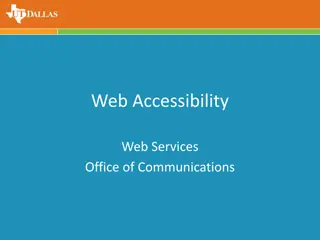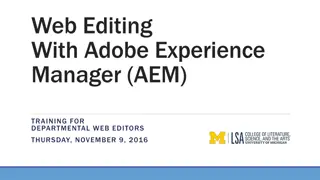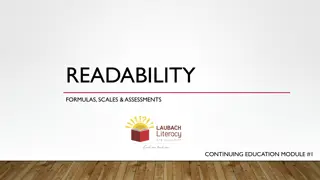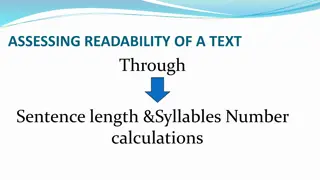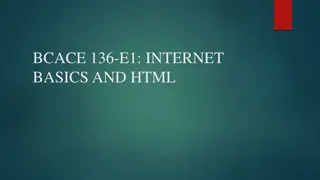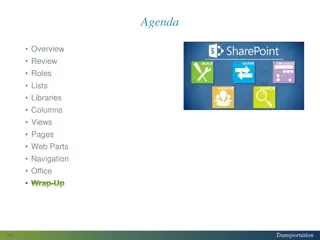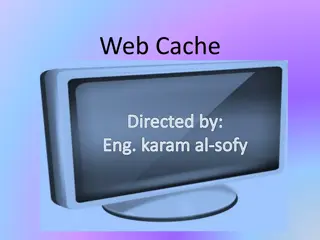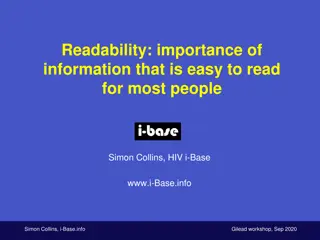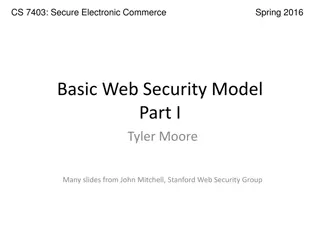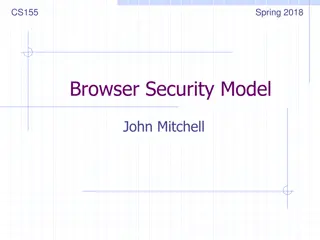Optimizing Web Content for Improved Readability and User Experience
Enhance your web content by creating, formatting, and revising it effectively. Learn how to improve readability through clear, simple language, and user-friendly formats. Gain insights on structuring headings, paragraphs, and lists for a better user experience. Explore the significance of ACA/Health reform/Obamacare in the healthcare landscape. Discover top-10 OIC web content style guidelines and more in this comprehensive guide.
Download Presentation

Please find below an Image/Link to download the presentation.
The content on the website is provided AS IS for your information and personal use only. It may not be sold, licensed, or shared on other websites without obtaining consent from the author.If you encounter any issues during the download, it is possible that the publisher has removed the file from their server.
You are allowed to download the files provided on this website for personal or commercial use, subject to the condition that they are used lawfully. All files are the property of their respective owners.
The content on the website is provided AS IS for your information and personal use only. It may not be sold, licensed, or shared on other websites without obtaining consent from the author.
E N D
Presentation Transcript
Web Training Labs December 7, 8 and 12 2016 September 6, 2024
Welcome! Open the Web lab exercises document using Windows Explorer/My Computer: Public > INTERNET > Web training > web-lab- exercises-dec2016 December 2016 Web lab September 6, 2024 2
Agenda Creating, formatting and revising Web content Consistent spelling, capitalization, etc., for common words and terms Top-10 OIC Web content style/standards guidelines Additional items to discuss? December 2016 Web lab September 6, 2024 3
Creating, formatting and revising Web content December 2016 Web lab September 6, 2024 4
Creating and improving Web content Well-written content Clear, simple, plain-talked Anticipates needs, questions Tested, reviewed Revised Questions to ask about your content Purpose? Primary user? Objective? User-friendly format? December 2016 Web lab September 6, 2024 5
Improve readability by reformatting Headings Short paragraphs Lists See P. 40-41, 50 from Writing for the Web December 2016 Web lab September 6, 2024 6
Headings that work well Questions Statements [key messages] Action phrases Nouns/noun phrases See P. 51-54 from Writing for the Web December 2016 Web lab September 6, 2024 7
Improve readability by reformatting Open Web lab exercise No. 1 and change the formatting/layout so it s easier to read. December 2016 Web lab September 6, 2024 8
What is the ACA/Health reform/Obamacare? What people call Obamacare is actually the Patient Protection and Affordable Care Act. However, people were calling it Obamacare before everyone even hammered out what it would be. It s a term mostly used by people who don t like the PPACA, and it s become popularized in part because PPACA is a really long and awkward name, even when you turn it into an acronym like that. Anyway, the PPACA made a bunch of new rules regarding health care, with the purpose of making health care more affordable for everyone. Opponents of the PPACA, on the other hand, feel that the rules it makes take away too many freedoms and force people (both individuals and businesses)to do things they shouldn t have to. So what does it do? Well, here is everything, in the order of when it goes into effect (because some of it happens later than other parts of it): Already in effect: It allows the Food and Drug Administration to approve more generic drugs (making for more competition in the market to drive down prices) It increases the rebates on drugs people get through Medicare (so drugs cost less) It establishes a non-profit group, that the government doesn t directly control, PCORI, to study different kinds of treatments to see what works better and is the best use of money. (Citation: Page 665, sec. 1181) It makes chain restaurants like McDonalds display how many calories are in all of their foods, so people can have an easier time making choices to eat healthy. (Citation: Page 499, sec. 4205) It makes a high-risk pool for people with pre-existing conditions. Basically, this is a way to slowly ease into getting rid of pre-existing conditions altogether. For now, people who already have health issues that would be considered pre-existing conditions can still get insurance, but at different rates than people without them. It renews some old policies, and calls for the appointment of various positions. It creates a new 10% tax on indoor tanning booths. (Citation: Page 923, sec. 5000B) It says that health insurance companies can no longer tell customers that they won t get any more coverage because they have hit a lifetime limit . Basically, if someone has paid for health insurance, that company can t tell that person that he s used that insurance too much throughout his life so they won t cover him any more. They can t do this for lifetime spending, and they re limited in how much they can do this for yearly spending. (Citation: Page 14, sec. 2711) Kids can continue to be covered by their parents health insurance until they re 26. No more pre-existing conditions for kids under the age of 19. Insurers have less ability to change the amount customers have to pay for their plans. People in a Medicare Gap get a rebate to make up for the extra money they would otherwise have to spend. Insurers can t just drop customers once they get sick. (Citation: Page 14, sec. 2712) December 2016 Web lab September 6, 2024 9
Block quotes Examples: Small group and individual templates, Medicare open enrollment Rarely used For verbatim quotes Left-justified is the standard for text Better options for formatting, highlighting: Headings, new paragraphs, list December 2016 Web lab September 6, 2024 10
Improve content using the active voice Why active instead of passive? Clarity Who s doing what to whom when Simplicity Reduced word clutter Precision Focuses on the action, not the situation MS Word s passive-sentences checker: File > Options > Proofing > Show Readability Statistics > Settings Exercise No. 2 Rewrite the [passive-voice] sentences. See P. 14, 63, 67 from Writing for the Web December 2016 Web lab September 6, 2024 11
From passive to active Before the semester was over, the new nursing program had been approved by the Curriculum Committee and the Board of Trustees. With five seconds left in the game, an illegal time-out was called by one of the players. Later in the day, the employees were informed of their loss of benefits by the boss herself. The major points of the lesson were quickly learned by the class, but they were also quickly forgotten by them. For several years, Chauncey was raised by his elderly grandmother. An unexpected tornado smashed several homes and uprooted trees in a suburb of Knoxville. I was surprised by the teacher's lack of sympathy. Tall buildings and mountain roads were avoided by Raoul because he had such a fear of heights. December 2016 Web lab September 6, 2024 12
Spelling, capitalization, punctuation, for common words and terms December 2016 Web lab September 6, 2024 13
Words that sound alike or have similar meanings Accept: Receive, agree / Except: All but, other than Affect (v): Influence, change / Effect (n): Outcome or result / Effect (v): Accomplish Alternate: Occurring, succeeding by turns / Alternative: Offering, expressing a choice Capital: Uppercase letters, money, the city that is the seat of government / Capitol: The building, nearby buildings and the campus Communication: A process / Communications: Items or methods used to communicate Farther: Physical distance / Further: In addition, to a greater degree Fewer: Used with countable nouns / Less: Used with collective or mass nouns Use: Employ objects for the purposes they were designed for / Utilize: find a practical use for December 2016 Web lab September 6, 2024 14
Grammar guidelines Who or that? When referring to people, use who, not that. Example: The men who played were all over 6 6 tall. Use it, not they when referring to an organization, department, business or other individual entity. Example: The Office of the Insurance Commissioner says it expects more citizen complaints next year. Only. Place this modifier next to the word or phrase it modifies. Example: We'll only write three papers this semester. vs. We'll write only three papers this semester. When explaining, use such as or for example, not like. Example: We observe federal holidays such as Veterans Day and Christmas Day. Expressing size, distance, quantities: more than and greater than refer to quantities, and over is used with measurements. Examples: We found more than 50 errors in the report. Mt. Rainier is over 14,000 feet high. Staff is not used alone. Use the staff or staff members [or employees ]. December 2016 Web lab September 6, 2024 15
One word or two? All right: A quality or feeling Alright: Isn t a word Anyone: Any person at all. Any one: A specific item in a group Anyway: In any case, nonetheless Any way: Any particular course, direction or manner Cleanup: An occurrence Clean up: An action Everyone: The entire group. Every one: Specific individual(s) December 2016 Web lab September 6, 2024 16
Avoid common errors a lot (many) or allot (allocate), not alot. afterward, not afterwards; toward, not towards; backward, not backwards; and forward, not forwards. among, not amongst. FAQ, not FAQs [the Q, question, is already plural] health care, not healthcare OK, not okay. people, not persons. Books and other creative works are titled, not entitled. Example: Her book, titled Start the Insanity, sold well. As a result, she felt she was entitled to VIP treatment. vs. (versus), not v.s., VS or vs ZIP code. Always capitalize this acronym (it stands for Zone Improvement Plan). December 2016 Web lab September 6, 2024 17
When to use rates or premiums An insurance rate: Is what insurers submit to the OIC for review and approval [or denial]. Doesn t vary based on an individual policyholder s information [age, driving record, location, etc.]. Determines the premiums policyholders pay. An insurance premium: Is what consumers/policyholders pay insurers for coverage. Varies based on an individual policyholder s information. Doesn t determine the rates insurers charge. December 2016 Web lab September 6, 2024 18
Top-10+ OIC Web content style/standards guidelines December 2016 Web lab September 6, 2024 19
TOP 10+ OIC STYLE/STANDARDSGUIDELINES The Office of the Insurance Commissioner and the OIC Washington state Include file info [type, size] when linking to PDFS, Word docs, Excel sheets, etc. Spell out acronyms/abbreviations/initials on first usage Lowercase position titles [when not preceding a name] April 21, not April 21st [except in text to be read aloud] Bold or use an icon to highlight text, not all caps Use sentence case [Not Title Case] Links open in the same window [usually] Add the outlink URL [and file info, if needed] The metadata title matches the page title [up to 60 characters] The metadata description is accurate and user-friendly [140 to 160 characters] Remove index.html from URLs Exercise #3 December 2016 Web lab September 6, 2024 20
Overview and history About us The Office of Insurance Commissioner, headed by Commissioner Mike Kreidler, oversees Washington's insurance industry to protect consumers and make sure that companies, agents and brokers follow the rules. The OIC is part of the NAIC, which represents insurance commissioner offices across the U.S. With 242 employees and 400 volunteers, we are one of the smaller state agencies, but we cover a lot of ground: Holding down costs to consumers by reviewing insurers' proposed premiums. Answering questions and investigating problems from more than 100,000 consumers each year. Recovering millions of dollars a year for consumers with insurance disputes or delays. Licensing and auditing the 37 insurers based in Washington -- and monitoring the other 2,135 that do business here. Testing, licensing and monitoring the more than 158,000 individuals and businesses that sell insurance here. Collecting more than $1.1 billion a biennium for the state s general operating budget. Maintaining a statewide network of volunteers that advise thousands of consumers on healthcare issues. OIC does this with virtually no state general-fund dollars. Most of our budget comes from assessments charged to the insurers we regulate. View the agency s complete budget documents. Mission Statement We protect consumers, the public interest and our state s economy through fair and efficient regulation of the insurance industry. History Washington's first state legislature created the office during the 1889-90 session. At first, we were part of the Secretary of State s office at the capital campus. Our main function was to register insurers doing business in Washington state. On March 19th, 1907, we became a separate agency and the people of Washington elected their first Insurance Commissioner. Insurance commissioners are elected every four years. Washington has had 8 insurance commissioners. View a list of past commissioners. NOTE: A complete history of the OIC is available upon request. December 2016 Web lab September 6, 2024 21
Metadata page descriptions Why are they important? Appear in search results Help users locate what they want Required by OIC s style/standards guide How are they created? Describe what the user can find/do on the page Write in plain language, using a complete sentence[s] Approx. 150 characters [including spaces] More than copying/pasting the title and/or the page s first few words December 2016 Web lab September 6, 2024 22
Metadata page descriptions examples Privacy policy <title>Privacy policy notice</title> <meta name="description" content="When you visit our website and browse, read pages, or download information, we will gather and store certain information about your visit. This information doesn't identify you personally."/> <meta name="author" content="Washington State Office of the Insurance Commissioner"> Talk to an insurance expert <title>Talk to an insurance expert</title> <meta name="keywords" content="insurance expert, contact us, insurance problem, insurance commissioner phone number,"> <meta name="description" content=" "/> <meta name="author" content="Washington State Office of the Insurance Commissioner"> December 2016 Web lab September 6, 2024 23
Writing metadata page descriptions Exercise #4 From Talk to an insurance expert Original: <title>Talk to an insurance expert</title> <meta name="keywords" content="insurance expert, contact us, insurance problem, insurance commissioner phone number,"> Revised: <title>Talk to an insurance expert</title> <meta name="keywords" content= ____________________________________________ __________________________________________________________________________________ __________________________________________________________________________________ December 2016 Web lab September 6, 2024 24
Resources The OIC s Web content style/standards guide Pre-publishing checklist Content-review checklist Dept. of Enterprise Services [training courses] Lynda.com [training courses] December 2016 Web lab September 6, 2024 25
Questions? Suggestions? Thanks! December 2016 Web lab September 6, 2024 26
